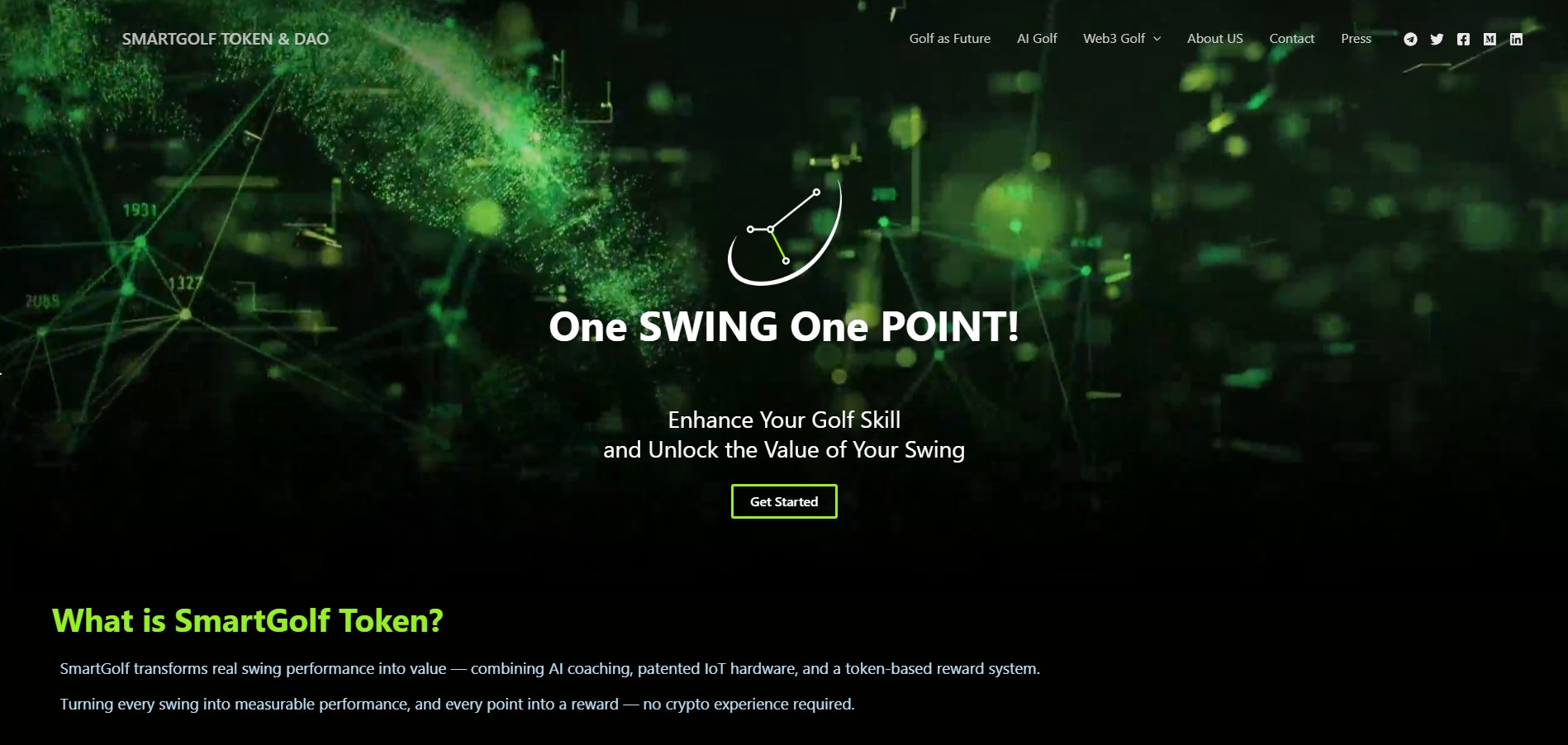
We’re excited to welcome – Jongmin Kim, Founder and CEO, SMARTGOLF Inc.
He has a background in AI-IoT, computer vision, and sports training, and has been building SmartGolf since the project’s 2015 Kickstarter.
Chris: SmartGolf started long before most Web3 sports projects, with real IoT hardware and PGA endorsements. What originally inspired you to merge golf, AI, and blockchain?
Kim: I saw three blockers in golf, cost, access, and slow feedback. The idea was simple, turn practice into progress and progress into rewards. With AI we deliver instant coaching anywhere. With IoT we measure the full swing. With blockchain we let players own their training data and convert verified effort into SGi through a points to token flow. It is a way to make sweat count, so people who put in the work get a digital asset for it.
Chris: How does SmartGolf balance its identity between a sports-tech brand and a Web3 ecosystem? Do you see one side leading the other in the long term?
Kim: Product first. SmartGolf is a sports tech company that uses Web3 where it clearly improves ownership, rewards, and governance. Hardware and AI coaching drive daily use. Web3 activates once people are training, turning verified practice points into SGi, enabling tournaments, coach payouts, and transparent funding through the DAO.
Chris: The AIX Club with its 9-axis sensor system is at the heart of SmartGolf’s ecosystem. What were the biggest technical or design challenges in turning a golf swing into blockchain data?
Kim: Three challenges. Signal fidelity across different grips and environments. Real time UX so feedback arrives within seconds. Standardization, defining a compact, privacy aware swing event that is verifiable. We built calibration, segmentation, feature extraction, and a canonical swing packet that can be signed and submitted.
Chris: Many golf devices track data but stop there. How does SmartGolf’s real-time swing-to-blockchain process create something genuinely new for both beginners and pros?
Kim: SmartGolf creates a real time proof of practice. Every valid swing adds points in the session. After anti abuse checks, points can convert to SGi on chain. That makes a new form of mining based on verified human effort, not hash power. Beginners get next drill guidance and entry level rewards. Pros get advanced metrics, skill progression, and higher tier challenges. Coaches and tournaments use the same proof of practice record to automate rewards and settlements.
Chris: SmartGolf uses both Ethereum mainnet and Polygon PoS. What influenced your choice of this dual-layer architecture?
Kim: Ethereum gives security, custody options, and governance. Polygon PoS gives low fee, high frequency actions for training rewards and in app game logic. Settlement, treasury, and governance on Ethereum. High volume micro actions and point conversions on Polygon, bridged with clear policies.
Chris: Unlike many Web3 fitness apps, SmartGolf backs every digital action with real, measurable data. How do you prevent abuse or false data submissions in swing verification?
Kim: Each swing is bound to device identity, timestamp, and a nonce. The app signs a swing packet with checksum features. Server models compare tempo, acceleration curves, and gyro profiles to user patterns and history. We flag anomalies, exclude repeated outliers, and require device attestation and session verification before any points to token conversion. Tournament and coach modes add extra reviews.
Chris: 5% of all wager-based transactions go directly to the DAO treasury. What are the most common types of proposals or initiatives the DAO community has funded so far?
Kim: Practical growth items, community tournaments with prize pools, coach onboarding grants for remote lessons, open analytics and bug bounty tasks, and school pilot support. Treasury inflows include platform fees such as 5 percent of wager based games. Outflows are voted by holders with small, measurable proposals focused on increasing active training.
Chris: You mentioned community-driven tournaments and coach onboarding. How do DAO votes influence real-world operations, like tournament rules or course integration?
Kim: Members vote on tournament formats and reward weights, for example accuracy versus improvement. The DAO can set regional coach quotas, approve partner locations for SmartGolf practice layouts, and fund course scanning or content packs. We favor short proposals so policy changes show up quickly in the app.
Chris: You’ve already partnered with schools and PGA programs. How do these partnerships shape your roadmap and the education side of your platform?
Kim: School pilots taught us to optimize for short sessions, clear progress tracking, and shared devices. PGA pros helped refine scoring and feedback language. This led to classroom mode, coach dashboards, verified lesson history, and simple institutional purchasing processes that are already in use.
Chris: With multiple patents and over 4,500 units sold, SmartGolf clearly isn’t a typical “token-first” project. How do you respond to people who call SGi just another “crypto token”?
Kim: SmartGolf is product led. We had market use, patents filed, and thousands of units sold before launching a token. SGi is earned from verified practice via a points to token conversion with finite daily budgets and anti abuse checks. The economy adds natural sinks like tournament entry, coach sessions, and course content. Treasury fees loop value back into community growth. This proof of effort model aims to support more resilient value dynamics than pure narrative tokens, though we never make price promises. The point is utility first, transparent governance, and real world usage driving demand.

Chris: Finally, what’s your personal vision of success for SmartGolf? Is it mass adoption by players, global DAO governance, or the creation of a completely new kind of sport economy?
Kim: Success means millions of people practicing anywhere, owning their data, and earning fair rewards for real improvement. SmartGolf becomes the operating system for golf training across schools, coaches, and communities. The DAO funds what works, and the proof of practice mining model keeps rewarding consistent effort over hype.





 usdt
usdt xrp
xrp

